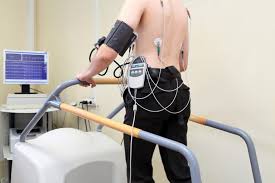
TMT
TMT stands for Treadmill Test, also known as an exercise stress test.About TMT
It's a non-invasive diagnostic tool used to assess your heart health by evaluating how your heart responds to physical exertion.
pen_spark
Treadmill test machine
Here's how a TMT works:
- You'll be outfitted with electrodes attached to your chest to monitor your heart's electrical activity (ECG). Your blood pressure will also be monitored throughout the test.
- You'll walk or jog on a treadmill starting at a slow pace and gradually increasing in incline and speed.
- The doctor will monitor your ECG, blood pressure, and any symptoms you experience, such as chest pain, shortness of breath, or lightheadedness.
- The test will be stopped when you reach your maximum exercise capacity, experience symptoms, or when certain ECG changes are observed.
Purposes of a TMT:
- Diagnose coronary artery disease (CAD) - the most common reason for a TMT. It helps identify blockages in the arteries that supply blood to your heart muscle.
- Evaluate chest pain - to determine if the pain is caused by angina (chest pain due to reduced blood flow to the heart) or other causes.
- Assess your fitness level - your performance on the TMT can provide an indication of your overall cardiovascular health and exercise capacity.
- Monitor the effectiveness of treatment - such as medication or coronary artery bypass surgery for heart conditions.
Benefits of a TMT:
- Relatively non-invasive and painless procedure.
- Provides valuable information about your heart health.
- Can help detect heart problems early when they are more treatable.
- Helps determine your safe exercise level.
Things to consider before a TMT:
- Inform your doctor about any medications you are taking, as some medications may need to be adjusted before the test.
- Wear loose-fitting, comfortable clothing and shoes suitable for walking or jogging.
- Let your doctor know if you have any concerns or questions about the test.
Overall, a TMT is a safe and valuable tool for assessing your heart health. If your doctor recommends a TMT, there is no reason to be apprehensive.